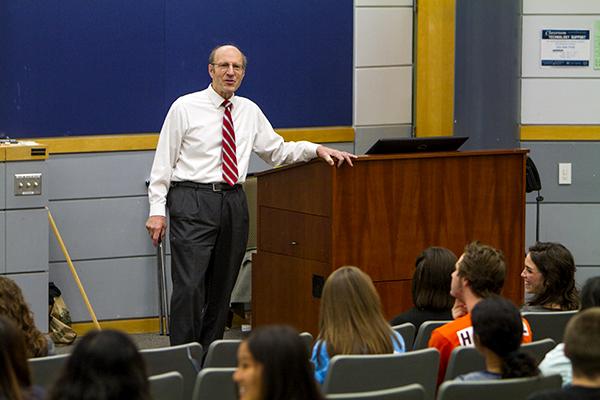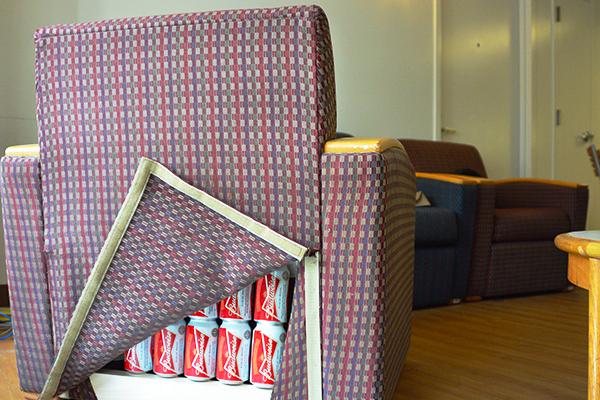Class is in session this weekend, but don’t worry – this isn’t on the midterm. Leave your notebook at home for these 50-minute crash courses, all taught by GW professors for students and their families.
From a discussion of Jackie Robinson as a catalyst for civil rights to a class on social networking tips, there’s a topic to pique the interest of every family member.
“Why Do Education Levels Rise With City Size and Gay Men Live in San Francisco?” | Anthony Yezer
Saturday Oct. 18, Marvin Center Room 308, 4 p.m.
If you’ve ever wondered why gay men are concentrated in San Francisco, whether you can predict which town Taylor Swift is most likely to move to or the truth behind D.C.’s restrictions on building heights, economics professor Anthony Yezer is your man. Yezer, who compares regional economics to “detective work,” will reveal the single factor that explains these odd differences in city distributions – and you’ll never guess what it is.
“I work on a lot of topics, but [regional economics] is the most fun,” Yezer said. “We love to kind of solve puzzles.”
“Teaching Students Nobel Prize-Winning Innovation: Magnetic Resonance Imaging (MRI)” | Jason Zara
Saturday Oct. 18, Marvin Center Room 309, 4 p.m.
Stop by this event and you’ll win a Nobel Prize. Well, kind of. Jason Zara, an associate professor in the School of Engineering and Applied Science, invites visitors to try to “invent” the Nobel Prize-winning MRI by coming up with the key innovations behind it, an exercise he uses with his biomedical engineering students. Zara aims to teach visitors how to “think like engineers” when solving problems.
“Engineers see problems that need solving, carefully consider what they know about the problem and then come up with a plan to attack the part of the solution they don’t already know,” he said. “We try to teach students these problem-solving techniques from a very early stage.”
“Social Networks, Leadership and Organizations” | Andrew Cohen
Friday Oct. 17, Marvin Center Room 307, 5 p.m.
*Good for older siblings
The hours you spend crafting the perfect Twitter bio, editing your LinkedIn page and chatting up old friends aren’t a waste of time, and assistant professor of management Andrew Cohen is here to explain why.
Cohen, who teaches courses in organizational behavior, leadership and human resource management, will explore how students can use social networking to their advantage in pursuing a career or leading an organization. He’ll touch on how institutions like schools, businesses and nonprofits use networks to achieve goals, and what leaders of those organizations can do to help.
“The notion of how networks, the web of interpersonal relationships among members of an organization, might shape and be shaped by the leadership of the organization is particularly important,” he said.
“Sex, Drugs, and Rock ‘n’ Roll: A Look at Some of the Big Cases in the Supreme Court’s 2014-2015 Term” | Jill Kasle
Saturday, Oct. 18, Marvin Center Continental Ballroom, 3 p.m.
Jill Kasle, an associate professor of public policy and administration who describes law as “the only club I ever wanted to belong to,” said she decided to become a lawyer at age 9 after a visit to the Supreme Court building.
With a lifetime of experience, Kasle will now share her knowledge of the biggest upcoming Supreme Court cases on topics ranging from gay marriage to the Affordable Care Act. Whether you’re a law student or more closely resemble a pre-Harvard Elle Woods, don’t miss this refresher.
“Celebrating the Impact and Legacy of Jackie Robinson” | Richard Zamoff
Friday, Oct. 17, Marvin Center Room 308, 5 p.m.
*Good for the whole family
Richard Zamoff, a professorial lecturer in the sociology department, is the biggest Jackie Robinson fan around – but not just in terms of baseball.
Zamoff has dedicated much of his career to the study of Robinson as an “informal civil rights leader,” whose courage and commitment to social change outweighed any achievements on the playing field. Take the course for a new perspective on sports, and learn how Robinson was a catalyst for changes like Brown v. Board of Education and President Harry Truman’s desegregation of the military.
“Most students only knew him as baseball, and I thought that was a terrible and significant omission in education,” Zamoff said. “He was an important civil rights person. I wanted to fill in those blanks.”







